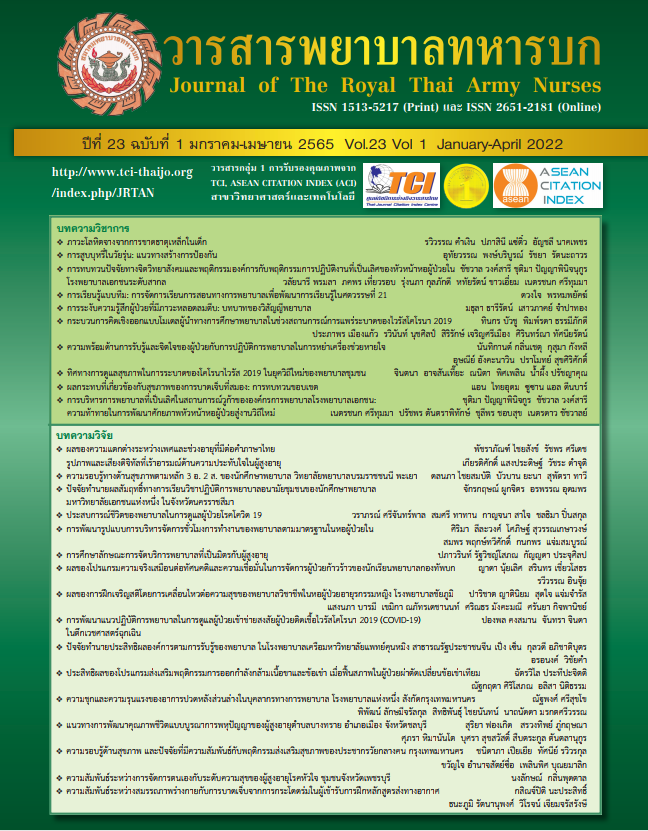The Effectiveness of Health Literacy Enhancing and Developing Program on A1C Blood Pressure Level Health Literacy and Diabetes and Hypertension Control Behaviors
Keywords:
Health literacy, Diabetes and Hypertension Control Behaviors, A1C, Blood PressureAbstract
This research is a two-group quasi-experimental pretest-posttest design. The objective is to examine the effectiveness of Health literacy Enhancing and Developing Program on Health literacy, Diabetes and Hypertension control behaviors, A1C and Blood Pressure level. The samples consisted of 70 patients with type 2 Diabetes Mellitus and Hypertension and put into experimental and control groups. Each group included 35 persons. Experimental instrument is a Health literacy Enhancing and Developing Program that was examined of content validity by 5 experts. The data were analyzed by using descriptive statistics and t-test. The results revealed that the mean of Health Literacy scores and Diabetes and Hypertension control behaviors scores of the experimental group higher than before enrolling in the program and higher than the control group at p-valve < .01. The mean of A1C, Systolic Blood Pressure (SBP) of the experimental group were lower than the control group at p-valve < .01. and .001 The mean of Diastolic BP levels of the experimental group and control group were not different. Thus, to enhance the Diabetes and Hypertension Control Behaviors by implementing a Health Literacy Enhancing Program for every new DM and HT’s patients.
Downloads
References
Nilsson, P.M., & Cederholm, J. Diabetes, hypertension, and outcome studies: overview 2010. Diabetes Care.2011; 34 (Supplement 2): 109-113.
Suwattanakul T.Factors Related to Blood Sugar Control among Diabetes Mellitus Type 2 Patients. Journal of Health Systems Research. 2018;12 (3):515-522. (in Thai)
Division of Health Education, Department of Health Service Support, Ministry of Public Health. A guide to health literacy for promoting healthy behavior of people who are at risks for type II diabetes and hypertension. Public Health Ministry: Nonthaburi; 2012. (in Thai)
Tanasugarn C, Neelapaichit N. Survey of health literacy in diabetes and hypertension patients. Nonthaburi: Health Education Division, Department of Health Service Support Ministry of Public Health; 2016. (in Thai)
Alvarez PM, Young LA, Mitchell M, Blakeney TG, Buse JB, Vu MB, Weaver MA, Rees J, Grimm K, Donahue KE. Health literacy, glycemic control, and physician-advised glucose self-monitoring use in type 2 diabetes. Diabetes Spectrum. 2018;31(4):344-7.
Gaffari-Fam S, Lotfi Y, Daemi A, Babazadeh T, Sarbazi E, Dargahi-Abbasabad G, Abri H. Impact of health literacy and self-care behaviors on health-related quality of life in Iranians with type 2 diabetes: a cross-sectional study. Health Qual. Life Outcomes. 2020; 18(1):1-9.
Istek, N., Karakurt, P.Effect of activities of daily on self-care agency in individuals with type 2 diabetes. J Diabetes Mellitus.2016: 6(4): 247-262
Hua-Sa-Phan Sub-district Health Center. Statistical reports of patients with diabetes and hypertension. Hua-Sa-Phan Sub-district Health Center, Phetchaburi Province.2019. (in Thai)
Nutbeem D. The evolving concept of health literacy. Soc Sci Med. 2008; 67:2072-8.
Arahung R., Hoontrakul S., Roojanavech S. The Effects of Health Literacy Enhancement Program on Hypertensive Prevention Behavior of Pre-hypertension Risk Group at a Community in Nakhon Pathom Province. Royal Thai Navy Medical Journal. 2018; 45(3):509-26. (in Thai)
Cohen J. Statistical power analysis. Curr. Dir. Psychol. Sci. 1992; 1(3):98-101.
Tachavijitjaru C. Health Literacy: A key Indicator towards Good Health Behavior and Health Outcomes. Journal of The Royal Thai Army Nurses. 2018; 19(25):1-11.(in Thai)
Santiparp P.The Results of Health Literate Promoting Program Using Based On Transformative Learning Via Social Medias for Hypertensive/Diabetes Mellitus Patients. Santapol College academic journal. 2020; 6(1):9-18. (in Thai)
Monnaibuntham A. The results of a health behavior change program on health literacy and empowerment blood sugar control and renal impairment of diabetic patients type 2 in Samransub-district health promoting hospital journal of khon kaen provincial health office.2019; 1(2):122-132. (in Thai)
Sriyasak A., Sarakshetrin A., Tongphet J., Ket-in V., Utaitum N., Mookui S., Meesub T. Proposed Policy for health management of older persons with Diabetes and Hypertension using health literacy in Primary Care Cluster context: Case study in PCC, Phetchaburi province (Research Report). Health Systems Research Institute. 2020. (in Thai)
Tol A, Pourreza A, Foroshani R, Tavassoli E. Assessing the effect of educational program based on small group on promoting knowledge and health literacy among women with type2 diabetes referring to selected hospitals affiliated to Tehran University of Medical Sciences. RJMS. 2013; 19(104).
Pannark P, Kaewprom C. The effectiveness of a program for health literacy development of the patients with uncontrolled type 2 Diabetes at Bangwua district, Chachoengsao province. Nursing journal of the ministry of public health. 2017;27(3):91-106. (in Thai)
Samruayruen K. and Sribenchamas N. Effectiveness of Medication Using Literacy Program on Medication Use Behavior among Hypertension Patients in Pho Sai Ngam health promoting hospital, Bueng Na Rang district, Phichit Province.EAU Heritage Journal Science and Technology. 2019;13(2):297-306. (in Thai)
Deenamjued W., Srisaeng P. Health Literacy of Healthy Aging among Elderly People in Bangkok Metropolitan: A Case Study for Promoting Health Literacy Elderly.Journal of The Royal Thai Army Nurses. 2019;20(2): 340-50. (in Thai)
Downloads
Published
How to Cite
Issue
Section
License
Copyright (c) 2022 Journal of The Royal Thai Army Nurses

This work is licensed under a Creative Commons Attribution-NonCommercial 4.0 International License.
บทความหรือข้อคิดเห็นใดใดที่ปรากฏในวารสารพยาบาลทหารบกเป็นวรรณกรรมของผู้เขียน ซึ่งบรรณาธิการหรือสมาคมพยาบาลทหารบก ไม่จำเป็นต้องเห็นด้วย
บทความที่ได้รับการตีพิมพ์เป็นลิขสิทธิ์ของวารสารพยาบาลทหารบก
The ideas and opinions expressed in the Journal of The Royal Thai Army Nurses are those of the authors and not necessarily those
of the editor or Royal Thai Army Nurses Association.






